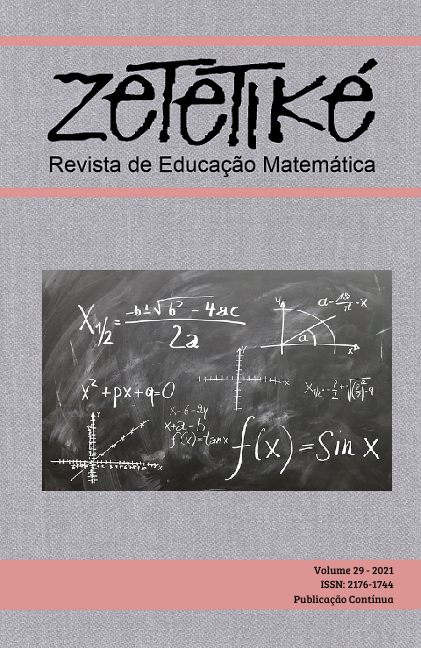Resumo
Nossa pesquisa se concentra no conhecimento especializado dos Professores de Matemática. Por meio de ferramentas teóricas impulsionadas pelo modelo de Conhecimento Especializado de Professores de Matemática (modelo MTSK) nos concentramos no conhecimento especializado dos professores educadores e realizamos um estudo qualitativo a fim de identificar dimensões e domínios específicos do conhecimento especializado dos professores educadores de Matemática. Exploramos uma extensão do modelo MTSK que pode caracterizar o conhecimento especializado do professor educador (modelo de Conhecimento Especializado de Professores de Matemática) - modelo MTESK. Especificamente, nosso foco será o Conhecimento de Conteúdo Pedagógico do modelo MTESK.
Referências
Aldon, G., Arzarello, F., Cusi, A., Garuti, R., Martignone, F., Robutti, O., Sabena, C., & Soury-Lavergne, S. (2013). The meta-didactical transposition: a model for analysing teachers education programs. In Lindmeier, A. M. & Heinze, A. (Eds.). Proceedings of the 37th Conference of the International Group for the Psychology of Mathematics Education (Vol. 1, pp. 97–124). Kiel, Germany: PME.
Ball, D. ., Thames, M. H., & Phelps, G. (2008). Content knowledge for teaching: What makes it special? Journal of Teacher Education, 59(5), 389–407.
Beswick, K., & Goos, M. (2018). Mathematics teacher educator knowledge: What do we know and where to from here? Journal of Mathematics Teacher Education, 21, 417–427.
Carrillo-Yáñez, J., Climent, N., Montes, M., Contreras, L.C., Flores-Medrano, E., Escudero-Ávila, D., … Muñoz-Catalán, M.C. (2018). The mathematics teacher’s specialised knowledge (MTSK) model. Research in Mathematics Education, 20(3), 236–253.
Escudero-Ávila, D., Montes, M., & Contreras, L.C. (2021). What do mathematics teacher educators need to know? Reflections emerging from the content of mathematics teacher education. In M. Goos, & K. Beswick (Eds.), The Learning and Development of Mathematics Teacher Educators, (pp. to appear). Cham, Switzerland: Springer.
Even R., Krainer K., Huang R. (2020). Education of Mathematics Teacher Educators. In: Lerman S. (eds), Encyclopedia of Mathematics Education. Springer, Cham.
Flores, E., Escudero, D. I., & Carrillo, J. (2013). A theoretical review of specialised content Knowledge. In B. Ubuz, C. Haser & M. A. Mariotti (Eds.), Proc. VIII Congress of the European Society for Research in Mathematics Education (CERME 8) (pp. 3055–3064). Antalya, Turkey: Middle East Technical University, Ankara.
Krainer K., Chapman O., Zaslavsky O. (2020). Mathematics Teacher Educator as Learner. In Lerman S. (eds) Encyclopedia of Mathematics Education. Springer, Cham.
Jaworski, B. (2008). Mathematics teacher educator learning and development: An introduction. In International Handbook of Mathematics Teacher Education (Vol. 4, pp. 1–13). Brill Sense.
Llinares, S., & Krainer, K. (2006). Mathematics (student) teachers and teacher educators as learners. In A. Gutiérrez & P. Boero (eds.), Handbook of research on the psychology of mathematics education (pp. 429–459). Brill Sense.
Loughran, J. (2014). Professionally developing as a teacher educator. Journal of teacher education, 65(4), 271–283.
Martignone, F., Ferretti, F., & Rodríguez-Muñiz (submitted). What should be the specialised knowledge of a mathematics teacher educator?
Montes, M. A., Aguilar, A., Carrillo, J., & Muñoz-Catalán, M. C. (2013). MTSK: from common and horizon knowledge to knowledge of topics and structures. In B. Ubuz, C. Haser & M. A. Mariotti (Eds.), Proc. VIII Congress of the European Society for Research in Mathematics Education (CERME 8) (pp. 3185–3194). Antalya, Turkey: Middle East Technical University, Ankara.
Patton, M. (2002). Qualitative research and evaluation methods. London, UK: Sage Publications.
Prediger, S., Roesken-Winter, B., & Leuders, T. (2019). Which research can support PD facilitators? Strategies for content-related PD research in the Three-Tetrahedron, Model. Journal of Mathematics Teacher Education, 22, 407–425.
Rasmussen, C., Zandieh, M,. & Wawro, M. (2009). How do you know which way the arrows go? The emergence and brokering of a classroom mathematics practice. In W.M. Roth (Ed.), Mathematical representations at the interface of the body and culture (pp. 171–218). Charlotte: Information Age Publishing.
Ribeiro, M., Martignone, F., Aslan-Tutak, F., Rø, K., & Montes, M. (2019). Introduction to the papers of TWG20: Mathematics teacher knowledge, beliefs, and identity. In: U. T. Jankvist, M. van den Heuvel-Panhuizen, & M. Veldhuis (Eds.), Proceedings of the Eleventh Congress of the European Society for Research in Mathematics Education, (pp. 3811-3814). Utrecht, the Netherlands: Freudenthal Group & Freudenthal Institute, Utrecht University and ERME.
Robutti O. (2020) Meta-didactical Transposition. In: Lerman S. (eds) Encyclopedia of Mathematics Education. Springer, Cham.
Shulman, L. (2008). Content knowledge for teaching: What makes it special. Journal of Teacher Education, 59(5), 389–407.
Tzur, R. (2001). Becoming a mathematics teacher-educator: Conceptualizing the terrain through self-reflective analysis. Journal of Mathematics Teacher Education, 4(4), 259–283.
Zeichner, K. (2005). Becoming a teacher educator: A personal perspective. Teaching and teacher education, 21(2), 117–124.

Este trabalho está licenciado sob uma licença Creative Commons Attribution-NonCommercial-NoDerivatives 4.0 International License.
Copyright (c) 2021 Zetetiké


